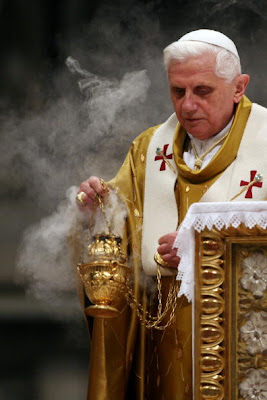
Yesterday Buddhist blogger extraordinaire, Danny Fisher posted a notice from the Vatican to the world Buddhist community on the occasion of this year’s Vesak.
If you don’t know, Vesak or Hanamatsuri is nominally the celebration of Gautama Siddhartha’s birth, although it actually becomes something bigger rolling the whole story into what might be Buddhism’s biggest holiday.
It is calculated differently by different Buddhist communities. The Catholic church chose a traditional Buddhist calendar calculation to extend their greetings, which this time around was April 3rd. Personally I follow the traditional Japanese adaptation to the Western calendar and break out the birthday cake on April the 8th.
It was nice of the Vatican to twist and turn and try to find something kind to say, even if it was pretty much just about how Buddhist monasticism is kind of sort of like Catholic monasticism.
It does appear that at the top of the Roman hierarchy there is no great love lost for Buddhism. In 1997, the then Cardinal Ratzinger famously observed “If Buddhism is attractive, it’s only because it suggests that by belonging to it you can touch the infinite, and you can have joy without concrete religious obligations,” He went on to opine, “It’s spiritually self-indulgent eroticism.” That is spiritual masturbation.
I can say this annoyed a lot of us. (Okay, it amused some of us, as well. And I think a couple kind of liked it…)
Now, Ratzinger wasn’t completely dismissive. In that same interview he suggested “In the 1950s someone said that the undoing of the Catholic church in the 20th century wouldn’t come from Marxism but from Buddhism. They were right.”
So, perhaps he spoke out of anxiety, and maybe we should cut him a little slack…
Here’s the text of the greeting.
Dear Buddhist friends,
1. The forthcoming feast of Vesakh/Hanamatsuri offers a welcome occasion to send you, on behalf of the Pontifical Council for Interreligious Dialogue, our sincere congratulations and cordial best wishes: may this feast once again bring joy and serenity to the hearts of all Buddhists throughout the world. This annual celebration offers Catholics an opportunity to exchange greetings with our Buddhist friends and neighbours, and in this way to strengthen the existing bonds of friendship and to create new ones. These ties of cordiality allow us to share with each other our joys, hopes and spiritual treasures.
2. While renewing our sense of closeness to you, Buddhists, in this period, it becomes clearer and clearer that together we are able not only to contribute, in fidelity to our respective spiritual traditions, to the well-being of our own communities, but also to the human community of the world. We keenly feel the challenge before us all represented, on the one hand, by the ever more extensive phenomenon of poverty in its various forms and, on the other hand, by the unbridled pursuit of material possessions and the pervasive shadow of consumerism.
3. As recently stated by His Holiness Pope Benedict XVI, poverty can be of two very different types, namely, a poverty “to be chosen” and a poverty “to be fought” (Homily, 1st January 2009). For a Christian, the poverty to be chosen is that which allows one to tread in the footsteps of Jesus Christ. By doing so a Christian becomes disposed to receive the graces of Christ, who for our sake became poor although he was rich, so that by his poverty we might become rich (Cf. 2 Corinthians 8, 9). We understand this poverty to mean above all an emptying of self, but we also see it as an acceptance of ourselves as we are, with our talents and our limitations. Such poverty creates in us a willingness to listen to God and to our brothers and sisters, being open to them, and respecting them as individuals. We value all creation, including the accomplishments of human work, but we are directed to do so in freedom and with gratitude, care and respect, enjoining a spirit of detachment which allows us to use the goods of this world as though we had nothing and yet possessed all things (Cf. 2 Corinthians 6, 10).
4. At the same time, as Pope Benedict noted, “there is a poverty, a deprivation, which God does not desire and which should be fought; a poverty that prevents people and families from living as befits their dignity; a poverty that offends justice and equality and that, as such, threatens peaceful co-existence (l.c.).” Furthermore, “in advanced wealthy societies, there is evidence of marginalization, as well as affective, moral, and spiritual poverty, seen in people whose interior lives are disoriented and who experience various forms of malaise despite their economic prosperity” (Message for World Day of Peace 2009, n. 2).
5. Whereas we as Catholics reflect in this way on the meaning of poverty, we are also attentive to your spiritual experience, dear Buddhist friends. We wish to thank you for your inspiring witness of non-attachment and contentment. Monks, nuns, and many lay devotees among you embrace a poverty “to be chosen” that spiritually nourishes the human heart, substantially enriching life with a deeper insight into the meaning of existence, and sustaining commitment to promoting the goodwill of the whole human community. Once again allow us to express our heartfelt greetings and to wish all of you a Happy Feast of Vesakh/Hanamatsuri.
Jean-Louis Cardinal Tauran
President
Archbishop Pier Luigi Celata
Secretary












